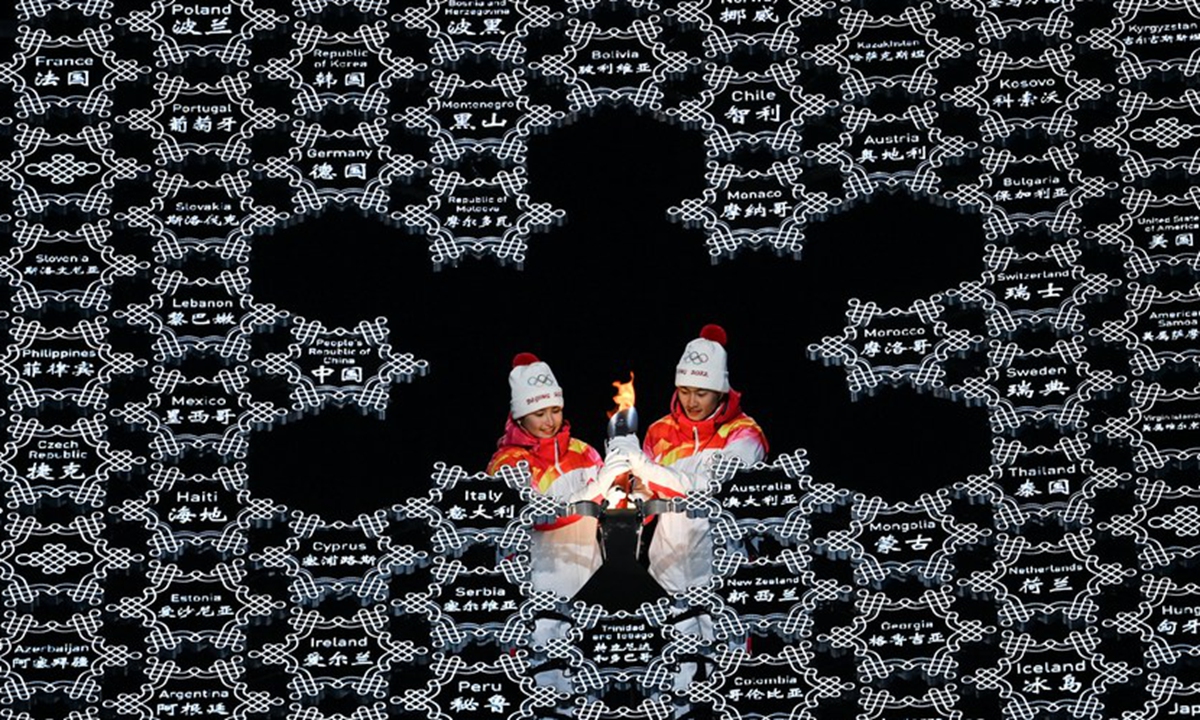
Torch bearers Dinigeer Yilamujiang (L) and Zhao Jiawen set the torch into the Olympic cauldron during the opening ceremony of the Beijing 2022 Olympic Winter Games at the National Stadium in Beijing, capital of China, Feb. 4, 2022. Photo: Xinhua
With the opening of the Beijing 2022 Winter Olympic Games, various competitions will start one after another. About 3,000 athletes from more than 90 countries and regions will write a new Olympic chapter of "Faster, Higher, Stronger - Together" in the world of ice and snow.
At the same time, the emotion brought about by the opening ceremony of the Games continues. The scale was not the largest, and the performance was not the most, but the very poetic countdown design, the crystal clear "five rings of ice and snow," the dazzling digital light, the romantic and beautiful snowflake-shaped cauldron, the unique and creative no-ignition ceremony with an environmentally friendly concept made people think all these are both "very modern" and "very Chinese." The enthusiastic praise for the opening ceremony from mainstream international public opinion serves as a sharp contrast to the bizarre comments made by individual politicians and media in the US and the West. The joy of athletes from all over the world at the opening ceremony completely bankrupted the "diplomatic boycott" of some countries against the Beijing Winter Olympics.
A part of the opening ceremony, which featured the traditional solar term "Li Chun" or "Beginning of Spring," aroused strong resonance on social media platforms. The COVID-19 pandemic has brought a huge impact on the societies, economies and people's livelihoods of all countries and regions, and has brought about severe challenges to the holding of global sports and events. The global ski market went from the best 2018-19 snow season directly into the worst 2019-20 season.
"Spring is coming, and everything is coming back to life." The Beijing Winter Olympics opened as scheduled, providing an important opportunity for the world. People are eager to bid farewell to winter and welcome spring through a stage and a grand event.
More than ever, we need to "face the future together." At the opening ceremony, with the "big snowflake" cauldron composed of snowflake-shaped guide cards of various delegations, some people read out the display of "there are no two identical snowflakes in the world," while others felt the humanistic sentiment of "the world is one family." The scene that pieces of different little snowflakes rely on each other, borrowing strength from each other, and finally working together to support the same torch, is very touching. The oriental concept of "Every beauty has its uniqueness, and all beauties stay peacefully together" complements the never-ending Olympic fire that originated in Greece, and illuminates the universal value that belongs to all mankind.
At the opening ceremony, when China's national anthem was played and the melody of the well-known Chinese song "Ode to the Motherland" started, many Chinese people had tears in their eyes. Their deep patriotic feelings were instantly ignited. They were warm, but not scorching, harmoniously blending with the doves of peace and the large snowflake that symbolizes unity at the scene. The Chinese people love their motherland, hoping the country will be prosperous and strong and the nation will rejuvenate. They also love peace and want to make a greater contribution to the world peace. All these feelings are sincere and from the bottom of their heart. Correspondingly, UN Secretary-General António Guterres said in Beijing that there is competition in the world, but that competition does not necessarily mean enmity. International Olympic Committee President Thomas Bach also said that even opponents that engage in fierce competition can coexist peacefully and respect each other, and this is the mission of the Olympic Movement.
In contrast, some certain US and Western media outlets are quite low-minded. When Uygur athlete Dinigeer Yilamujiang from Northwest China's Xinjiang Uygur Autonomous Region, the origin of human skiing, and Han athlete Zhao Jiawen lit the Olympic cauldron under global attention at the opening ceremony, some US media outlets even made fallacies claiming the Xinjiang girl was "forced to light the torch," in a bid to cover the fact that they have long been engaged in making up the so-called genocide rumors. Many foreign netizens bluntly said the claims are "too absurd." For an athlete, it is a lifelong dream to be the main torchbearer at the opening ceremony of the Olympic Games. According to the logic of some US media, "China forced the athlete to realize her lifelong dream." Is there any more absurd logic than this one?
Fortunately, truth cannot be distorted and no one can stop the footsteps of the spring.
A Chinese poem said that "a little fire often makes one feel the warms of spring's sunshine, and a burning furnace could break up the darkness of the night." The Chinese nation has a deep spirit of dedication since ancient times. At a time when the world urgently needs to warm each other and jointly curb difficulties, what the Beijing Winter Games are bringing to the world is the "message of the spring." People have every reason to expect that there will be a flourishing spring on the snow and ice of the Beijing Winter Games.




